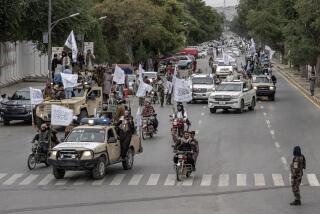Uzbekistan’s Chance to Act
- Share via
The ouster of the Taliban from Afghanistan has produced an important side effect for neighboring Uzbekistan, removing a sanctuary for Islamic fundamentalist warriors challenging the repressive government of Islam Karimov. The Uzbek president--a holdover from Soviet rule of his land and a man apparently bent on staying as leader until he dies--should take advantage of an improved security situation by loosening the political reins.
Uzbekistan is the pivot of Central Asia, a region of former Soviet republics that are desperately poor despite their deposits of oil and gas. It has outlawed even the most moderate Islamic political movements and in the process turned some groups that might have become the loyal opposition into potentially violent foes. The government designates religious leaders and requires religious organizations to register, in effect deciding who can preach and who cannot. By not developing political institutions, Uzbekistan is setting itself up for an ugly payback down the road.
When the Soviet Union disintegrated a decade ago, residents in the five former republics hoped for political liberalization, religious freedom and economic improvement with the removal of the shackles of central planning. Instead, the leaders then are the leaders now and the Soviet-style bureaucracy continues its mismanagement. The area is predominantly Muslim, but Uzbekistan and the other nations are secular and worry about militant Islam.
The argument against liberalization has been the need for security. But the quick ouster of the Taliban has removed one source of danger and has discredited Islamic fundamentalists throughout the region.
Karimov is more secure now and should allow a free press, legitimate opposition political parties and the unrestricted operation of human rights groups. There’s a lesson to be learned from Pakistan, where Islamic political parties have done terribly at the polls but have gained influence in the mosques and religious schools when secular governments and political organizations have proved feeble or corrupt. Like Afghanistan and Pakistan, Uzbekistan needs dramatic economic progress to lift the terrible poverty that helps fuel extremist movements.
Of the five central republics, Uzbekistan has most distanced itself from Russia, which still considers the region part of its area of influence. Even before Sept. 11, Karimov looked to the United States as a counterweight to Moscow. Now Washington has even greater influence because it has removed a major source of danger to Uzbekistan. It should encourage Karimov to improve the lives of his people, not just tighten his grip on power.
U.S.-financed Radio Free Europe did a good job in December in helping persuade a Czech court not to send back to Uzbekistan Mukhammat Salikh, who ran against Karimov for president in 1991 and two years later fled the country out of realistic fear for his life. Washington must stay focused on Central Asia, beyond Afghanistan, to help prevent nations from disintegrating into failed states that are fertile ground for terrorism.
More to Read
Sign up for Essential California
The most important California stories and recommendations in your inbox every morning.
You may occasionally receive promotional content from the Los Angeles Times.










